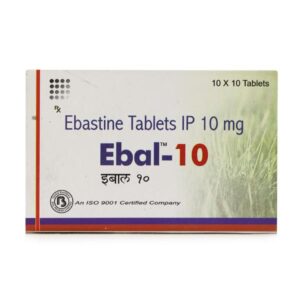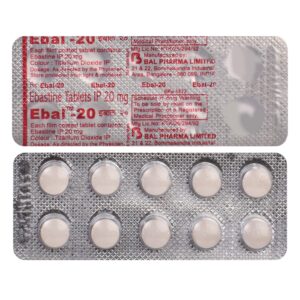EBASTINE
EBASTINE: Ebastine is an antihistamine drug that is commonly used to treat seasonal allergic rhinitis (hay fever) and chronic idiopathic urticaria (long-term hives without a known cause). It belongs to the second-generation antihistamine group.
The mechanism of action of ebastine involves blocking the H1 receptors in the body, which are responsible for producing allergic symptoms. By inhibiting these receptors, ebastine helps to reduce the release of histamine, a chemical that can cause itching, sneezing, runny nose, and other allergy symptoms.
The typical recommended dose of ebastine for adults is 10 mg once daily. However, the dosage may vary depending on the individual and the severity of symptoms. It is advisable to follow the instructions provided by the healthcare professional or the information on the drug label.
Common side effects of ebastine may include drowsiness, headache, dry mouth, fatigue, and gastrointestinal disturbances (such as nausea and diarrhea). However, these side effects are usually mild and temporary. It is important to note that ebastine may cause drowsiness or impair cognitive function, so it is advised to avoid driving or operating heavy machinery until the individual knows how the drug affects them.
Some individuals may experience rare but severe side effects such as an allergic reaction (difficulty breathing, swelling of the face or throat, rash), irregular heartbeat, or severe dizziness. If any of these serious side effects occur, immediate medical attention should be sought.
It is important to consult with a healthcare professional or pharmacist before starting ebastine, as they can provide personalized information and advice, especially if the individual has any pre-existing medical conditions or is taking other medications that may interact with ebastine.




